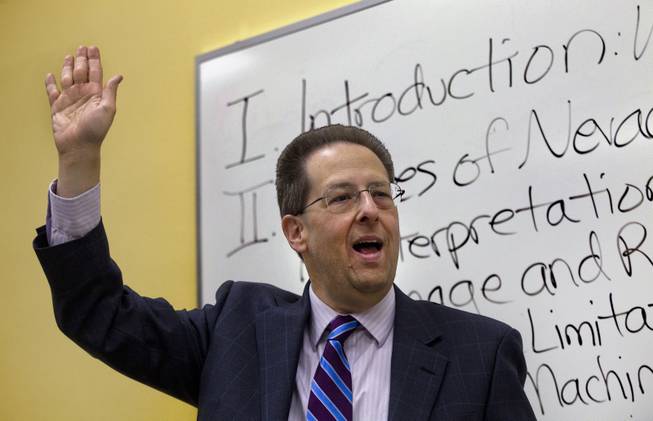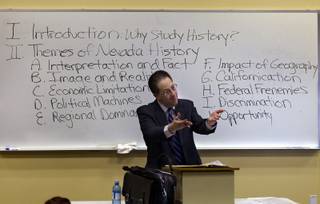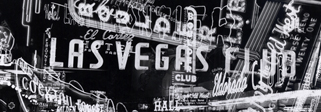
Historian Michael Green takes a quick poll while teaching a Nevada history class at CSN on Monday, Jan. 27, 2014.
Sunday, March 30, 2014 | 2 a.m.
Sun coverage
History professor Michael Green is approving homework assignments, and he understands that reading 500 pages and writing a term paper on the shifting political values of Nevada Republicans in the 1860s might seem irrelevant to many students — especially students who are sitting in class not for any love of history but because it’s three more units toward graduation.
So Green, who teaches U.S. and Nevada history and specializes in Abraham Lincoln at the College of Southern Nevada, links history with student interests.
He invites an art student to do a charcoal drawing of the president that captures his personality — an expectation that requires research. He allows a hopeful playwright to write a three-act play about the mob in Las Vegas. He once asked the class to take on the role of Jack McCoy, the prosecutor on the TV drama “Law and Order,” to prosecute the king of England for abusing the colonies. Students majoring in education are encouraged to prepare history study outlines for high school students. And others are asked to adopt the persona of a historical figure and create a résumé and job application cover letter to win a political post in the colonies or the frontier West. The student will learn something about the historical figure — and how to play up one’s own skills in landing a job in today’s Las Vegas.
Green’s inventive approach to teaching history won him recognition this year as one of the nation’s finest college instructors. In this case, the American Historical Association, with the co-sponsorship of the Society for History Education, bestowed its Eugene Asher Distinguished Teaching Award to Green, lauding him for “extraordinary” innovation.
From Green’s point of view, history is a chance to teach not just history but critical thinking skills, especially when considering that many of his students are the first in their families to go to college. He doesn’t want to squander the chance to make a difference.
His approach, beyond creative homework: Engaging storytelling, inspired by longtime Los Angeles Dodgers play-by-play announcer Vin Scully. “I was 8 when I heard his voice on the transistor radio. I fell in love with baseball and wanted to be him. He’s an incredible story teller who knew how to unfold a story using cadence and a punch line. There’s analysis and interpretation in history, but it’s also a story.”
•••
Green attended Las Vegas schools and graduated from UNLV as a history major — his second love, after journalism. At 17, he had been hired by the publisher of the Valley Times, who had heard Green’s presentation in a Rotary Club speech contest and offered the clear-thinking teenager a job. Reporting was seductive — he covered a speech by then-President Ronald Reagan and hustled on deadline the night that Frank “Lefty” Rosenthal’s car was bombed.
“Pretty heady stuff for a kid to be doing,” Green said.
But the paper folded and Green, then 19, rationalized: “Newspapers go bankrupt but colleges don’t. So I’ll major in history.”
He earned bachelor’s and master’s degrees in history at UNLV, focusing on how the 1876 presidential election played out in Nevada. Next came his quest for a doctorate; he was accepted at six of the seven universities where he applied and chose Columbia in New York City. His dissertation tackled the evolution of the Republican Party’s ideology during the Civil War.
Green was hired by CSN in 1995, with a hunger to tell stories, and a penchant for impersonating presidents for drama or comic relief. Today he teaches five courses there — each filled with 35 students — as well as an upper-class honors history course for 16 UNLV students. If Green's name sounds familiar, it's likely because he's the go-to historian for reporters looking for Nevada facts framed by his particular insights and sense of humor. For good measure, he also teaches Las Vegas history in UNLV extension courses. Some people might think it’s a grind. Green, 49, says it keeps him young.
Here are some highlights from The Sunday's interview with him:
How about a Lincoln insight?
He visited a prostitute at least once, but in this case, nothing happened. Her services cost $5, and he had only $3. She was willing to let him pay the balance later, but he didn’t think that kind of debt was a good idea.
Do you pepper your students with questions to make sure they’re current in their readings?
I don’t put students on the spot because I never liked being put on the spot. At Columbia, we had to read several books a week. In one course I read only one of the three for the week, and the professor called on me. Luckily his question was on the one book I had read. And people don’t think there’s prayer in the classroom?
What’s your goal in each class?
You have to have some ham in you. You want the students to enjoy the class and leave saying, “I enjoyed that.”
What’s the value of learning history if you don’t care about history?
You become trained not just in finding out what happened but why it happened — which is a valuable talent no matter what career path you take. When you’re 4 years old, the most important word is “Why?” If you study history, you are an eternal 4-year-old.
How has teaching changed over the years?
Computers. They’ve given us broad access to a wealth of information and misinformation, and have made people lazy. We’ve lost the pleasure and pain of trying to find a piece of information by scouring books for it.
Do you still see plagiarism?
Yeah. One student wrote an essay on Pat McCarran that I figured had been plagiarized. It was. But the best part was, I was quoted in it.
At the end of the semester, what do you hope is the students’ take-away?
That they’ve learned how to think, not what to think. I’m not there to sell a point of view but to encourage them to ask, “Why?”
What kind of feedback do you get from students?
One student complained after getting back a paper, “You marked up my grammar.” I said yes. He said, “This isn’t an English class.” I said, “If it’s taught in English, it’s an English class.”


 Explore Las Vegas’ past and present
Explore Las Vegas’ past and present Boomtown: The Story Behind Sin City
Boomtown: The Story Behind Sin City Neon Boneyard: A 360° look
Neon Boneyard: A 360° look Mob Ties: See the connections
Mob Ties: See the connections Implosions: Classic casinos crumble
Implosions: Classic casinos crumble
Join the Discussion:
Check this out for a full explanation of our conversion to the LiveFyre commenting system and instructions on how to sign up for an account.
Full comments policy